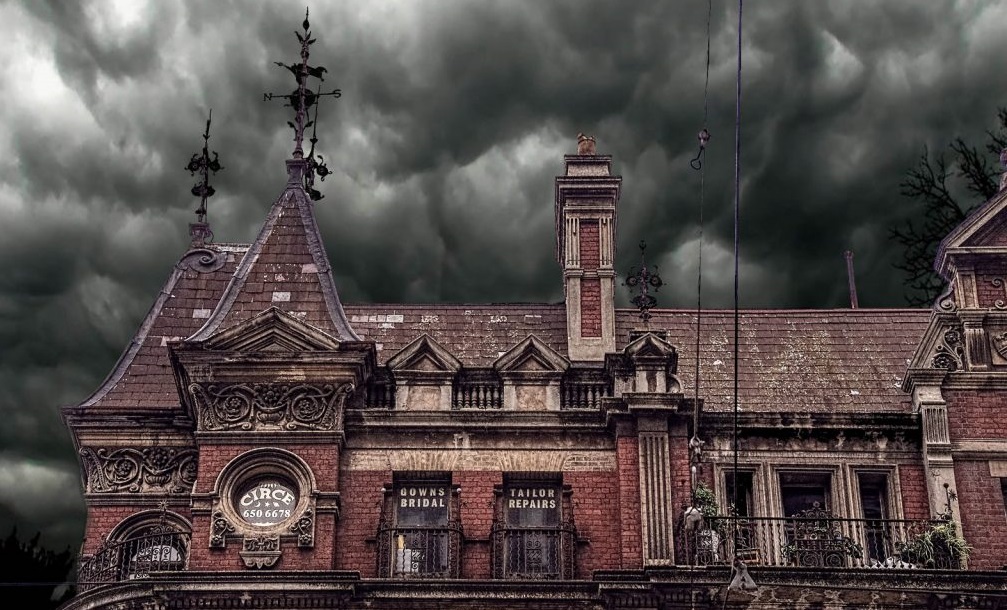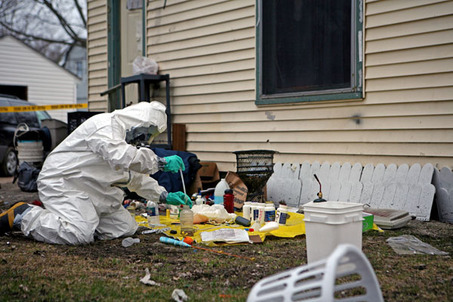Overview:
Dealing with stigmatized properties can be unforgettable to both real estate agents and their clients. Also known as ‘tainted’ real estate among other monikers, the issue of stigmatized property can be very important for Oregon home buyers and home sellers.

‘…that long black cloud is comin’ down,
I feel like I’m knockin’ on heaven’s door…’ Bob Dylan
Hear the podcast edition of this article by clicking the ‘play’ button below, or click here.
Every experienced Realtor has them: Stories rarely shared with clients that involve particularly unnerving moments in an agent’s real estate career. And, for purposes of this article, we aren’t talking about simple cases of a flea-infested house, or one with no water or electricity. The topic? Stigmatized properties. Homes where people may have died, crimes have occurred, or where ghosts are said to roam.

Definition of Stigmatize
Here’s one dictionary definition of the word stigmatize:
Stigmatize verb
1. to set some mark of disgrace or infamy upon
While this definition may be readily grasped, state laws vary significantly in how they address stigmatized property. This presentation is not a legal analysis, but in Oregon under the broadest sense of the term, it’s commonly understood that a stigmatized property can range from minor, where where there are problems, like mold, to major, where undesirable things have occurred, such as a heinous crime. So it’s important to realize that there are degrees of stigma. And what may bother one person may not seem so bad to another.
One of the classic examples of stigmatized property is a home where someone dies inside a house. Another example is a home where drugs like methamphetamine have been manufactured. Yet other example, though generally considered less worrisome to many buyers, is a foreclosed home where a former owner loses the property due to job loss.

This Happened to Me: A Case Study
Here’s an actual true story that helps to illustrate the impact of stigmatized property. While at work one day, I received a phone call and determined the caller was clearly distressed. I quickly recognize the caller as a client I assisted with a home purchase months earlier. Listening further, I detect serious concern in his voice as I’d never observed from him before.
As the client talks, I listen while automatically running through a brief mental checklist of his closed transaction:
‘Paperwork completed correctly?’ Check.
‘Home inspection performed?’ Check
‘All inspection issues addressed or negotiated?’ Check.
‘Building permits researched?’ Check
‘Insurance, title report, loan and closing documents taken care of?’ Check.
I run through a few more items in my mind, then hear him say the word ‘Ghost.’

In the Beginning
After looking at many homes, this buyer and his wife ended up making an offer that had some ‘back and forth’ on the price, but it was ultimately accepted. Looking back at the transaction, there was never any indication to suggest this would be anything but a ‘normal’ home purchase. And everything was normal. Until after the transaction closed. Which is when things took a decidedly different turn.
Not very long after this buyer and his wife moved into their recently purchased home, they began to hear strange noises, usually in the middle of the night, like around 2 or 3 AM. But then things got even weirder.
The sounds they heard appeared to emanate from inside the house for no readily explainable reason. Sounds like dropped tableware, moving furniture, bells ringing. You get the idea. There was no reason for them to expect anything specific, except these noises were apparently coming from inside the house…and at odd hours.
After a while of having their sleep disturbed, the homebuyers grew concerned and began to ask around the neighborhood. “Do you hear strange sounds at night like we do?” After being told “No” by at least one neighbor, one neighbor asked if the homebuyers knew about the event that had occurred inside their home.
Story specifics vary, but one of the neighbors explained that a child had died inside the house and was then laid to rest on the property. Understandably, this distressed the buyers, who thought they should have been told before buying the home.
After speaking with the home buyers, I next called the seller’s real estate agent for the transaction and simply asked: “Did you know that the property had a history of a death in the house? “Yes,” he quickly answered, then followed up with what I knew aligned with what Oregon real estate agents are instructed regarding state real estate law. “But my broker told me we didn’t have to disclose it.” And he was correct.
I also understood that Realtor’s fiduciary responsibility toward his seller client; Because if the seller’s agent had openly revealed the situation while marketing it, there was a good chance the property would have sold for considerably less. Usually, the rule is ‘disclose, even if an item seems trivial.’ Yet in this instance, there was no state law requiring such disclosure and the seller had a vested interest in not bringing the issue up.
As a result of the impact from their home purchase of the stigmatized home, the homebuyers moved and rented out the property. Witnessing this unpleasant situation had me researching to better determine what might have been done differently. At the time, there were no online resources solely dedicated to determining if a house is stigmatized. On top of that, repeated online searches eventually turned up one news story relating to the property. However, that was accomplished by a search using the specific house address and buried in a list of much other website information. It was virtually a ‘needle in a haystack.’

Rules of Disclosure
Realtors are compelled to abide by real estate law. So what exactly is required by an Oregon real estate agent regarding stigmatized, or other ‘tainted’ property? Oregon law states in Oregon Revised Statutes 93.275 the following excerpted incidents as among those considered not material to a real property transaction:
(a) The fact or suspicion that the real property or a neighboring property was the site of a death by violent crime, by suicide or by any other manner;
(b) The fact or suspicion that the real property or a neighboring property was the site of a crime, political activity, religious activity or any other act or occurrence that does not adversely affect the physical condition of or title to real property;
What’s Legal Vs. What’s Right
Was not disclosing such history the right thing to do, though? You be the judge. That’s where there is a divergence of opinion and it’s not always because someone is buying or selling a property. To some buyers, what has happened in the past within the four walls of a house, especially a death, matters. Other buyers may have a more practical perspective and and appear to be less bothered by property history. Here is information on a court case where a buyer sued a homeseller who did not disclose stigmatizing details. As you will read there, there are two sides to the story of stigmatized properties.
And in an odd twist, some reports suggest properties located near a cemetery actually sell for considerably more money. As a result, there are diverse opinions on certain kinds of stigma. Take for example houses considered ‘haunted.’ A Realtor survey found that most people are open to purchasing a haunted house.

Why Stigmatized Properties Are Different
One reason stigmatized properties are different is because they don’t affect everyone the same way. Another reason is because factors that stigmatize a property vary. Some are undeniably gruesome, like violent death, while other, more common stigmatizing factors have limited psychological affect, like bank foreclosure. Yet other stigmas, such as a former meth lab, are doubly troublesome, since they carry both a market stigma plus can render a property unfinanceable.
Stigmatized properties are uniquely different than usual issues like dry rot or a leaky roof because that they frequently involve very human emotions. And when we consider what makes a home, where children are raised, birthdays and anniversaries are celebrated and many cherished memories are created, common sense dictates that a house should comport with the real estate concept of ‘quiet enjoyment,’ least of all being awakened at 3 AM to later be surprised with what has occurred in your own home.
 There’s a Website for That
There’s a Website for That
So important is the issue of certain real estate stigmas that there are even websites for consumers to research for them. For example, homebuyers concerned about a possible death in a particular home can now search at websites like DiedInHouse.com in an effort to determine such information. However, be aware that this kind of online search may provide an incomplete portrayal of what you’re seeking.
 Buyer Beware
Buyer Beware
Websites that purport to provide a report on stigmatized real estate typically charge a fee and they are certainly not foolproof. In fact, a recent search of several confirmed ‘death houses’ in Oregon found no record in such a website dedicated to providing this kind of information. What these websites sometimes say in their results is that they ‘do not have any records’ of specific activity. Given my anecdotal ‘test searches’ of known locations where violent death did occur, yet where no records were located, appears to suggest such databases may be small, rarely updated, or otherwise inadequate.
What’s A Buyer to Do?
First, understand limitations of Oregon real estate law. Certain real estate factors simply do not need to be disclosed.
Second, realize that websites claiming to provide information on stigmatized properties can be severely lacking. So if more fully determining a property’s stigmatization status is important to you, you may need to address this on your own in a variety of ways explained below.
Third, if your Realtor, family member or friend is more ‘computer savvy’ than you are, have them perform some research. Regardless, some homebuyers may wish to work on this themselves.

Researching a Stigmatized Property
It’s important to realize that a great deal of data may not be on the Internet, or easily found there. Yet that’s generally a fast way to get started. So if you have concern about possibly purchasing a property and want to see if there is information to be found, here’s one possible research approach:
Perform Internet searches using different search engines (Google, Bing, among others). Each time you search, type in the property address several different ways. For example, if there are many different pages that turn up for a specific address, try enclosing the search address using closed quotes.
One example might look like this: “123 E. Main Street, Portland, OR” and also “123 East Main Street, Portland, OR” along with several other methods, including spelling out the state and possibly leaving the word ‘street’ out altogether. Try also typing in a possibly related word in your search, like “123 E. Main Street, Portland OR” followed by the word “police” or “arrest” or “murder” or “crime” or “death.” Also realize that in certain counties and towns, the direction is used AFTER the street name. So in Salem, the address might be “123 Main Street East, Salem, OR” along with other variations.
You get the idea. What you’re trying to do is determine any especially untoward activity associated with that specific house you may purchase. Other potentially effective ways to help determine more about a specific property regarding possible stigmatization is to ask the neighbors, or your local police department.
What’s A Seller to Do?
Usually the best advice for homesellers is to ‘Disclose, disclose, disclose.’ Yet there are exceptions. For example, in Oregon it is illegal to disclose certain facts about a property.
Under Oregon law, neither the seller nor their agent is allowed to disclose that an owner or occupant of the real property has or had human immunodeficiency virus or acquired immune deficiency syndrome.
If you’re unsure about how disclosure requirements apply to your situation, it’s generally a good idea to consult your Realtor for more information and/or an attorney specializing in real estate law.